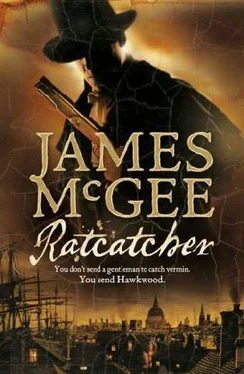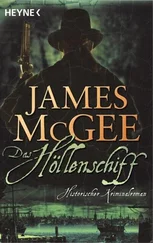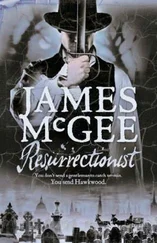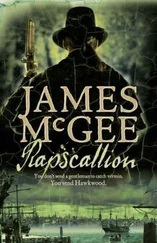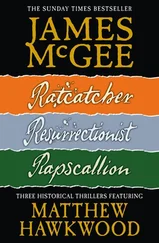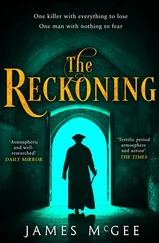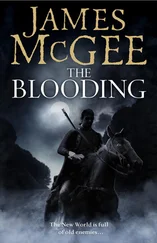James McGee - Ratcatcher
Здесь есть возможность читать онлайн «James McGee - Ratcatcher» — ознакомительный отрывок электронной книги совершенно бесплатно, а после прочтения отрывка купить полную версию. В некоторых случаях можно слушать аудио, скачать через торрент в формате fb2 и присутствует краткое содержание. Жанр: Исторический детектив, на английском языке. Описание произведения, (предисловие) а так же отзывы посетителей доступны на портале библиотеки ЛибКат.
- Название:Ratcatcher
- Автор:
- Жанр:
- Год:неизвестен
- ISBN:нет данных
- Рейтинг книги:4 / 5. Голосов: 1
-
Избранное:Добавить в избранное
- Отзывы:
-
Ваша оценка:
- 80
- 1
- 2
- 3
- 4
- 5
Ratcatcher: краткое содержание, описание и аннотация
Предлагаем к чтению аннотацию, описание, краткое содержание или предисловие (зависит от того, что написал сам автор книги «Ratcatcher»). Если вы не нашли необходимую информацию о книге — напишите в комментариях, мы постараемся отыскать её.
Ratcatcher — читать онлайн ознакомительный отрывок
Ниже представлен текст книги, разбитый по страницам. Система сохранения места последней прочитанной страницы, позволяет с удобством читать онлайн бесплатно книгу «Ratcatcher», без необходимости каждый раз заново искать на чём Вы остановились. Поставьте закладку, и сможете в любой момент перейти на страницу, на которой закончили чтение.
Интервал:
Закладка:
And so it had proved, but not before the bodies of two grenadiers lay dead in the sand, slaughtered by pistol ball and sword blade respectively.
That one man on foot should have wreaked such havoc should have given the major a degree of warning that this was not some local peasant out poaching for game and that it might have been wiser to apprehend the felon alive in order to question him about his origins and intentions.
The sharp crack of a chasseur’s carbine, however, had put paid to that possibility. The fleeing man had reached the water when the ball struck low on his left side, propelling him into the shallows. The major, seeing the quarry stagger towards the middle of the stream, had shouted at his men not to fire again. As the body disappeared beneath the surface, the major had spurred his men forward, but it had been too late. Dragged under by the current, the corpse had been swept away.
Or so it had been assumed.
They had found the discarded pistol close to the body of one of the dead grenadiers and had shown it to Lee upon his return to shore. Lee had immediately put paid to the major’s speculation that the man had been nothing more than an inquisitive local and the admiral’s suggestion that he may have been a would-be assassin sent by Bourbon exiles.
The pistol, Lee had revealed, was English-made; “York”, the city of manufacture, engraved on to the stock had been the giveaway. Probably naval issue, Lee had surmised, an officer’s sidearm.
Which meant what?
The British knew of the device, Lee had told the Emperor. It had been offered to them seven years before. They’d turned it down. However, it wasn’t outside the realms of possibility that they’d received fresh intelligence relating to the improvements in design. It would have been only natural for them to dispatch agents to investigate.
It’s what I would have done, Lee had admitted.
Which was when the Emperor had suggested they take a walk, and the mission had been born.
Lee had been surprised by the Emperor’s candour.
The war in Spain was going badly, the Emperor had admitted. Wellington was proving a formidable opponent. His victories were undermining the will of France’s allies. Allegiances were changing. It was not only the southern borders that were under threat. It had been hoped that Tsar Alexander’s support would remain steadfast, but doubts had been expressed. Severe measures might have to be taken.
It had been Lee who had voiced the unthinkable.
“Your Majesty would attack Russia?”
The Emperor, to Lee’s astonishment, had merely shrugged. “Perhaps.”
Which would have meant the Emperor’s armies would be split, and thus considerably weakened.
“We are very much in need of a miracle,” the Emperor had told him with a grim smile. “A small one would suffice.”
It was possible that Fulton’s device was the key, the means by which Britain’s supply lines to Spain could be disrupted, giving the French time to regroup and push Wellington back into the sea. Which in turn would undoubtedly force Tsar Alexander to reconsider his responsibilities.
“All things are possible, Your Majesty,” had been Lee’s tactful response.
The Emperor had given Lee one month. Whatever was required would be made available. He was to report directly to Admiral Decres.
And remain vigilant.
But they had not allowed for Lieutenant Harry St John Ramillies’ return from the dead.
It had been Bonaparte’s agents who, following the interrogation and execution of suspected Bourbon sympathizers, had passed word that, miraculously, the British spy was still alive, recovering from his wounds, and on the run, aided by the Royalist underground. Moreover, it was believed he carried copies of the submersible’s design.
A brave run that had been brought to an abrupt and bloody end on a lonely, rain-lashed stretch of heathland. But the death of Ramillies, allied to the recovery of the drawings, meant that the mission could at last proceed as planned.
Until, like a pair of inquisitive, meddlesome magpies, Runners Warlock and Hawkwood had come calling. Not that it hadn’t been inevitable, Lee supposed, that the disappearance of Master Woodburn, a craftsman of some repute, would attract the attention of the authorities.
What hadn’t been expected was the competence displayed by the men assigned to track down the missing clockmaker. These were not your usual run-of-the-mill constables, ineffective, corrupt Charlies, but professional thief-takers.
But now, they too, had been dealt with. The seaman, Scully, had seen to that. Scully might be a bruiser, short on brains and heavy on brawn, but he had nevertheless proved exceedingly useful. He had removed both Warlock and Hawkwood, and in removing those two, he had provided Lee with a clear run to his objective. The destruction of which was now only a matter of hours away.
Lee’s eyes moved to the window once more. The Thames was the city’s life force. The femoral artery. But an artery that was about to be severed in spectacular fashion. The wound might not be fatal, but it had the potential to paralyse the nation and set back the British war effort for some considerable time, allowing Emperor Bonaparte the opportunity to marshal his forces and launch an offensive.
So now a ship would burn, a prince would die, and the British would quake in their beds.
And a father and brother would be avenged.
Revenge, Lee thought, as he began to dress, was indeed a repast best served cold.
Hawkwood, seated in the bow of the rowing boat, rested his elbows on the oar and tried to ignore the sticky rivulets of sweat trickling uncomfortably down his back and beneath his armpits. His discarded jacket lay on the seat beside him. Jago, resting on his own oar, chuckled at Hawkwood’s discomfort.
Suspecting that the river would be the most practical means of access, Hawkwood had used his warrant to commandeer the boat from a wherryman at the Ratcliff Cross stairs. The canny boat owner had tried to extract the exorbitant sum of one shilling for the inconvenience and temporary disruption to his livelihood, until a glare from Jago warned him not to push his luck. In the end, Hawkwood had compromised and paid sixpence, four times the normal crossing charge. Better to keep the man quiet, he reasoned, than have him blab to every Tom, Dick and Harry that a Runner was on the prowl.
They were drifting fifty yards off the Limehouse shore. Looking over his left shoulder, Hawkwood could see the bend in the river and the western entrance to the canals and lagoons that formed the huge West India Docks. Beyond the dock entrance, the river widened out to almost a quarter of a mile as it ran southwards towards Deptford and the Isle of Dogs.
With the sun barely over the rooftops, the river was already bustling with activity. Lighters, barges, bumboats, cutters and colliers vied for wharf space and an opportunity to discharge their loads and take on new cargoes, while further downstream the tall, slender masts of the larger vessels, East Indiamen and Royal Navy warships, could be seen outlined against the rapidly brightening sky.
Onshore, it was just as congested. Jetties groaned under the weight of coal sacks, tobacco bales, baulks of timber, liquor casks, and crates of bleating livestock. The smells emanating from the river bank reflected the myriad trades plied within the borough, from the sharp, acrid stench of the lime kilns to the throat-souring odour of the tar yards.
Suddenly, Jago sat up and nodded towards the river bank. “Land ho, Cap’n.”
Hawkwood twisted in his seat, and followed Jago’s gaze.
There was little to distinguish the warehouse from the rest of the waterfront buildings, save for the faded name board nailed on to the wall above the jetty. Located adjacent to the entrance to Limekiln Dock and abutted by a densely packed collection of granaries and storehouses, the warehouse, with its adjoining yard, was not much different from a thousand other commercial properties lining the river from the Tower to Tilbury, albeit in slightly better repair than most.
Читать дальшеИнтервал:
Закладка:
Похожие книги на «Ratcatcher»
Представляем Вашему вниманию похожие книги на «Ratcatcher» списком для выбора. Мы отобрали схожую по названию и смыслу литературу в надежде предоставить читателям больше вариантов отыскать новые, интересные, ещё непрочитанные произведения.
Обсуждение, отзывы о книге «Ratcatcher» и просто собственные мнения читателей. Оставьте ваши комментарии, напишите, что Вы думаете о произведении, его смысле или главных героях. Укажите что конкретно понравилось, а что нет, и почему Вы так считаете.
